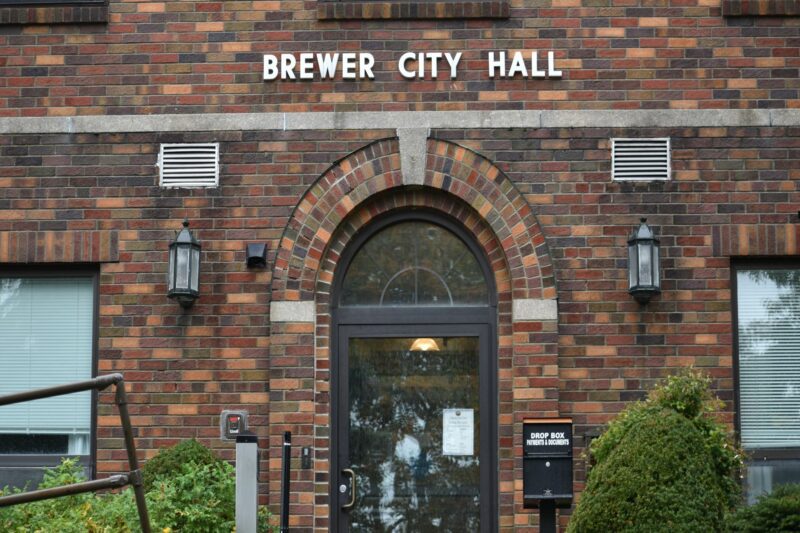With just over three weeks until the election, Steve Wong thinks his city of Brewer will favor incumbent Gov. Janet Mills — but it is going to be close.
Wong, the co-owner of the Creative Arts Center studio who identifies as a conservative, said he would prefer former Republican Gov. Paul LePage, but thinks Mills has captured people’s attention with so many advertisements. That, and a sense that the city is leaning more progressive overall, despite a strong number of conservatives who sound off on social media and moderates who keep their cards close to their chest.
Wong has crossed party lines a few times to support friends in legislative races, but is cautious about talking politics in his shop.
“When it comes time to vote I show my support at the polls. I don’t get too vocal,” he said. “And being in this business and everything, and dealing with the public — you turn half the people off, and you need a little bit of everybody.”
That’s the way politics go in Brewer, a former mill town of about 7,600 registered voters across the Penobscot River from Bangor. Republicans have a slight edge with 36 percent of the registered voters, with Democrats and unenrolled voters taking up about a third each.
While the Republican candidate has won the city in the last four presidential elections, three were very close: The 2008, 2012 and 2020 elections were all decided by less than 3 percentage points. Its Maine House representation is split between a Democrat and a Republican.
While big cities can define an election’s outcome, Maine’s purple towns — where elections can be decided by a handful of votes and independents often take up a sizable share of the electorate — can draw the most speculation. Mills, a Democrat, is increasingly the favorite in the governor’s race with recent polls giving her double-digit leads over LePage. But Democrats are cautious with economic headwinds expected to continue. Communities like Brewer could decide who takes the Blaine House.
“For these races, turnout is going to be extremely important,” said Robert Glover, an associate professor of political science at the University of Maine. “Sure, the bigger population centers matter, but it will be interesting to see what’s being done to turn out these smaller communities.”
Glover, a former Brewer resident himself, said the city is a good example of communities that might lean conservative but resist more polarizing candidates of all stripes. That’s evident in its support of 2nd Congressional District Republican candidate Bruce Poliquin over his primary challenger, Elizabeth Caruso, and the district’s support of state Sen. Kim Rosen, R-Bucksport, over former state Rep. Larry Lockman, R-Bradley, he said.
It is also apparent in its support of Archie Verow, a Democrat who died in his third term but who served Brewer at the municipal level for decades. Glover described him as a “cautious Democrat” who did not always align with the more progressive members of his party.
Wong said Mills has done a few things he likes, but he is primarily concerned about spending in Augusta and what happens when the COVID-19 federal aid provided to states is spent. He is also concerned about the homeless challenges and substance abuse problems the state faces.
“LePage knows how to pull back on the purse strings,” he said.

Locals describe Brewer as friendly and close-knit, a city in the midst of trying to revitalize its tiny downtown and expand a scenic riverwalk. Rep. Kevin O’Connell, D-Brewer, a former Brewer city councilor and mayor who is running for a second legislative term, described it as a “small-town Americana” when he was growing up.
The community is pretty supportive and friendly, but Brewer fitness trainer Adam Clark was wary of guessing who it might support for governor, noting there are signs supporting various candidates all over town.
“Up here, you get a mix of both sides,” he said.
Glover said Brewer is an example of many small Maine communities that embody a more centrist attitude, rejecting more extreme candidates of either party. It is also a place where more younger people priced out of urban areas like Bangor may choose to settle, changing the political dynamics marginally over time.
They are also places where independent voters can be crucial, although Glover said many of them often align ideologically with one party but are frustrated by the dominating two-party system.
“This idea that there are these untapped independent voters, that’s not usually the case,” he said.
That could be said of a suburban Augusta town like Manchester, voting population 2,234 as of the June primaries. A bedroom community for state employees with recreational opportunities afforded by Cobbosseecontee Lake, independents there make up 30 percent of enrolled voters, according to the Maine Secretary of State’s office, compared to 35 percent Republicans and 30 percent Democrats.
Manchester supported former Democratic President Barack Obama in 2008 and 2012; in both elections, Obama carried the town by about 6 percentage points. It then flipped to support Republican Donald Trump for president in 2016, only to lose to Democratic President Joe Biden in 2020. Those races were much closer — the 2016 contest was decided by 2 percentage points and even less than that in 2020.
Such a narrow margin was not a surprise to town selectman Robert Gasper. A Manchester resident since 1976 and a Republican, he has seen the town’s independent and unenrolled members rise over the years, which he attributed to state employees not wanting to show a political affiliation.
“You always wonder how they’re going to vote, because they’re the ones that will make a difference when the time comes,” he said.
The town is not as politically active as neighbors Hallowell and Gardiner, said Garry Hinkley, the chair of the Manchester Democrats committee and also a selectman. But he believes the race for governor in Manchester will be close because of what he described as a balance of more educated liberals and higher-income conservatives in the town.
Indeed, gubernatorial races in Manchester have been tight and have flipped over the years: Republican Shawn Moody defeated Mills there by just 12 votes. LePage had a much more comfortable margin in 2014, defeating Democrat Mike Michaud by 507 votes.
For Manchester independent Dave Worthing, it all comes down to which candidate can present their ideas in the most reasonable manner. A life-long resident and active volunteer in the community, he said spending at the state level is important to him, and he is likely to support Mills – but that does not mean he will support the next Democrat in four years. As to how his town will vote come November, he did not want to guess.
“Everyone I’ve spoken with thinks it’s going to be close,” Worthing said.
Caitlin Andrews covers state government and elections for The Maine Monitor. Reach her with other story ideas by email: caitlin@themainemonitor.org.





